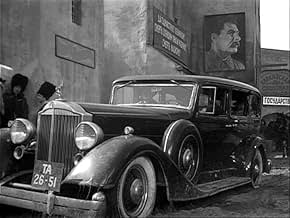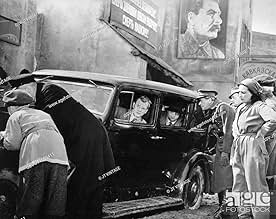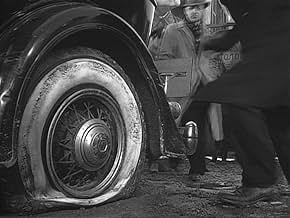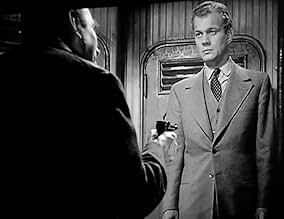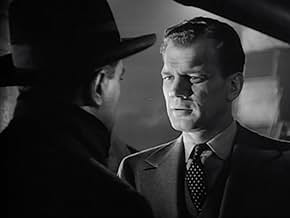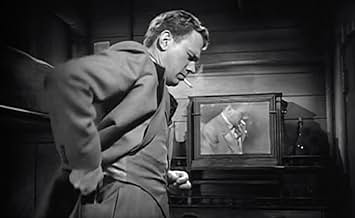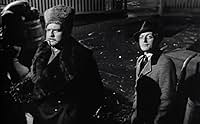NOTE IMDb
6,5/10
5 k
MA NOTE
Ajouter une intrigue dans votre langueAn American ballistics expert in Turkey finds himself targeted by German agents. Safe passage home by ship is arranged for him, but he soon discovers that his pursuers are also on board.An American ballistics expert in Turkey finds himself targeted by German agents. Safe passage home by ship is arranged for him, but he soon discovers that his pursuers are also on board.An American ballistics expert in Turkey finds himself targeted by German agents. Safe passage home by ship is arranged for him, but he soon discovers that his pursuers are also on board.
- Réalisation
- Scénario
- Casting principal
Dolores Del Río
- Josette Martel
- (as Dolores Del Rio)
Anna De Linsky
- Russian Maid at Batumi Hotel
- (non crédité)
Jerome de Nuccio
- Turkish Officer
- (non crédité)
Herbert Drake
- Ship's Steward
- (non crédité)
Avis à la une
Howard Graham is an American engineer returning from Istanbul with his wife Stephanie. A close call in a Turkish nightclub sees a man assassinated by mistake when really Howard was the target and he and his wife are quickly taken to the Turkish secret police. Colonel Haki informs him that he is a target of the Nazis and immediately gets him transit out of the country on the next available boat while he protects his wife. However Howard quickly finds that he is far from being out of danger as his pursuers are on the boat as well.
With keys part of the Third Man cast involved in this thriller, I decided to take a look and had hoped for a film that perhaps would be as enjoyable as that. However it was not quite all that I hoped it would have been as I didn't find myself that gripped by it. The early scenes suggest a real mystery with a good pace but quickly the mistaken assassination of the magician is slowed down and complicated by unnecessary characters and dialogue, some of which seemed to serve very little purpose other than setting up some other scenes later on. With Mrs Howard away somewhere out of vision and therefore out of mind, we focus on the action on other boat and, although quite tense at points, it didn't have the sort of sustained tension that should have been made easier by the confined location of the boat. It does enough to engage though and I did find it quite enjoyable but those claiming this as a classic up there with some of Welles' other films are mistaken because this is only quite good not any more than that.
The cast was the reason I was here but they were not as good as they have been in other films. Cotton is a bit brash and loud and aspects of his character aren't brought out that well; he was still an interesting leading man but mainly because I have always liked him. Welles has a small role and seems to enjoy himself playing a role that has little screen time but is mentioned throughout the film; I'm not sure if he did direct his own scenes but that is the rumour. Del Rio is sexy and a nice presence but I wasn't overly taken by her other than that. Moss tends to steal the film with his big character lurking around early on, meanwhile the rest of the support are OK, with other languages being spoken rather than the usual American actors putting on vague accents as was often the case (and still is!). Assuming that he did direct the majority, if not all, of the film (and I do believe this) Foster does a very good job of working with shadows in early scenes and in the boat some of his angles are effective, although it is easy to see (with some of his shots) why people generally believe that it was Welles calling the shots.
Overall this is an enjoyable thriller with a dark atmosphere brought out by good direction throughout. The cast are OK but none of the famous faces really stood out for me here, meanwhile the plot was not as tight as it needed to be, leaving some holes and using some distracting plot devices along the way. Still worth seeing but not the classic that it is often touted around as being.
With keys part of the Third Man cast involved in this thriller, I decided to take a look and had hoped for a film that perhaps would be as enjoyable as that. However it was not quite all that I hoped it would have been as I didn't find myself that gripped by it. The early scenes suggest a real mystery with a good pace but quickly the mistaken assassination of the magician is slowed down and complicated by unnecessary characters and dialogue, some of which seemed to serve very little purpose other than setting up some other scenes later on. With Mrs Howard away somewhere out of vision and therefore out of mind, we focus on the action on other boat and, although quite tense at points, it didn't have the sort of sustained tension that should have been made easier by the confined location of the boat. It does enough to engage though and I did find it quite enjoyable but those claiming this as a classic up there with some of Welles' other films are mistaken because this is only quite good not any more than that.
The cast was the reason I was here but they were not as good as they have been in other films. Cotton is a bit brash and loud and aspects of his character aren't brought out that well; he was still an interesting leading man but mainly because I have always liked him. Welles has a small role and seems to enjoy himself playing a role that has little screen time but is mentioned throughout the film; I'm not sure if he did direct his own scenes but that is the rumour. Del Rio is sexy and a nice presence but I wasn't overly taken by her other than that. Moss tends to steal the film with his big character lurking around early on, meanwhile the rest of the support are OK, with other languages being spoken rather than the usual American actors putting on vague accents as was often the case (and still is!). Assuming that he did direct the majority, if not all, of the film (and I do believe this) Foster does a very good job of working with shadows in early scenes and in the boat some of his angles are effective, although it is easy to see (with some of his shots) why people generally believe that it was Welles calling the shots.
Overall this is an enjoyable thriller with a dark atmosphere brought out by good direction throughout. The cast are OK but none of the famous faces really stood out for me here, meanwhile the plot was not as tight as it needed to be, leaving some holes and using some distracting plot devices along the way. Still worth seeing but not the classic that it is often touted around as being.
Joseph Cotten plays an American armaments engineer on the run from the Nazis in "Journey into Fear," a 1943 film with a script by Cotten (from a story by Eric Ambler) and costarring Orson Welles and Delores del Rio. Cotten is working on a deal to supply Turkey with weapons to fight the Axis. The Nazis don't want the deal made and are trying to stop Cotten from getting back to the U.S.
There are some very exciting scenes in this extremely atmospheric film, in particular on the ledge of a building between Cotten and the terrifying assassin. Most of the film takes place on board a dingy ship where Cotten is taken, thus beginning his Kafka-esquire nightmare.
This is an entertaining film for sure, but I've always been troubled by it. First of all, it seems like there are scenes missing. Second, it's on the confusing side since there are irrelevant characters thrown in. Third, you can drive a truck through some of the plot holes. Fourth, the ending to me has always felt abrupt.
Suspenseful? Yes. Intriguing? Yes. Ultimately disappointing? Yes. Cotten is good as a man blundering through something he can't quite figure out - the problem is, the audience can't quite figure it out either. Welles has a small but effective role as Dr. Haki.
Strong on style, weak on substance.
There are some very exciting scenes in this extremely atmospheric film, in particular on the ledge of a building between Cotten and the terrifying assassin. Most of the film takes place on board a dingy ship where Cotten is taken, thus beginning his Kafka-esquire nightmare.
This is an entertaining film for sure, but I've always been troubled by it. First of all, it seems like there are scenes missing. Second, it's on the confusing side since there are irrelevant characters thrown in. Third, you can drive a truck through some of the plot holes. Fourth, the ending to me has always felt abrupt.
Suspenseful? Yes. Intriguing? Yes. Ultimately disappointing? Yes. Cotten is good as a man blundering through something he can't quite figure out - the problem is, the audience can't quite figure it out either. Welles has a small but effective role as Dr. Haki.
Strong on style, weak on substance.
Orson Welles graciously denied having any directing role in Norman Foster's 'Journey into Fear (1943),' though his influence appears to be all over it. 'Citizen Kane (1941)' first showcased Welles' fondness for filming people via low and high-angled cameras, a stylistic technique that distorts statures, placing the audience in a position either of power or helplessness. Here, the talented Karl Struss who also worked on such films as 'Sunrise: A Song of Two Humans (1927)' and 'Dr. Jekyll and Mr. Hyde (1931)' employs similar techniques, capturing human faces with a threatening immediacy that distorts their features and suggests imminent danger. You won't, of course, fail to notice that the film's cast also boasts more than a few Welles regulars, mostly members of his Mercury Theatre team Joseph Cotten, Agnes Moorehead, Everett Sloane, Ruth Warrick and Welles himself. The film's screenplay was written by Cotten, his sole attempt at writing {outside some uncredited work on 'The Magnificent Ambersons (1942)'}, a pity since the dialogue is frequently crisp, intelligent and memorable.
'Journey into Fear' is one of those rare WWII-themed films of the early 1940s that you wouldn't automatically class as propaganda. Indeed, the Nazis are only mentioned in passing, and the sinister agents who attempt to assassinate Cotten could just as easily be motivated by reasons other than war. Much of the story takes place on a small passenger ship, on which American engineer Howard Graham (Cotten) seeks refuge from German assassins, who are hell-bent on delaying his return home with important Allied intelligence. Silent enemy Peter Banat (played by Welles' agent, Jack Moss) watches ominously from across the ship's cabin, never saying a word, but suggesting sadistic menace through every dryly-amused smirk. Cotten is strong in the lead role, playing Graham as a frightened and confused amateur, a role reminiscent of Holly Martins from 'The Third Man (1949),' rather than the experienced and resourceful American spy we would otherwise expect in such a film. Welles lends his mighty presence to the role of the Turkish Colonel Haki, though he is noticeably more subdued than usual.
In one final manner, 'Journey into Evil' is very much like an Orson Welles film: it was re-edited at the studio's request. According to some sources, Welles did some of the trimming himself, recutting the final reel and adding Joseph Cotten's rather awkward narration. At just 68 minutes in length, the film certainly feels as though it has been tampered with. The relationship between Graham and Rosette (Dolores del Rio) is brief and poorly explored, and certainly not worthy of the repeated reassurances that the former frequently bestows upon his anxious wife (Ruth Warrick); there's little indication that the their affiliation extended beyond exchanging a few harmless pleasantries. Though the film doesn't exactly feel incomplete as did a noir like Renoir's 'The Woman on the Beach (1947)' the bare-bones narrative gives the sense of a minor and inconsequential work. Even so, 'Journey into Evil' is well worth seeking out for its terrific photography including a superb climax on the slippery ledges of a hotel exterior and the talents of a very talented cast.
'Journey into Fear' is one of those rare WWII-themed films of the early 1940s that you wouldn't automatically class as propaganda. Indeed, the Nazis are only mentioned in passing, and the sinister agents who attempt to assassinate Cotten could just as easily be motivated by reasons other than war. Much of the story takes place on a small passenger ship, on which American engineer Howard Graham (Cotten) seeks refuge from German assassins, who are hell-bent on delaying his return home with important Allied intelligence. Silent enemy Peter Banat (played by Welles' agent, Jack Moss) watches ominously from across the ship's cabin, never saying a word, but suggesting sadistic menace through every dryly-amused smirk. Cotten is strong in the lead role, playing Graham as a frightened and confused amateur, a role reminiscent of Holly Martins from 'The Third Man (1949),' rather than the experienced and resourceful American spy we would otherwise expect in such a film. Welles lends his mighty presence to the role of the Turkish Colonel Haki, though he is noticeably more subdued than usual.
In one final manner, 'Journey into Evil' is very much like an Orson Welles film: it was re-edited at the studio's request. According to some sources, Welles did some of the trimming himself, recutting the final reel and adding Joseph Cotten's rather awkward narration. At just 68 minutes in length, the film certainly feels as though it has been tampered with. The relationship between Graham and Rosette (Dolores del Rio) is brief and poorly explored, and certainly not worthy of the repeated reassurances that the former frequently bestows upon his anxious wife (Ruth Warrick); there's little indication that the their affiliation extended beyond exchanging a few harmless pleasantries. Though the film doesn't exactly feel incomplete as did a noir like Renoir's 'The Woman on the Beach (1947)' the bare-bones narrative gives the sense of a minor and inconsequential work. Even so, 'Journey into Evil' is well worth seeking out for its terrific photography including a superb climax on the slippery ledges of a hotel exterior and the talents of a very talented cast.
While returning from a conference munitions expert Joseph Cotten and his wife Ruth Warrick are taken to a nightclub in Istanbul by the mysterious Edward Sloane where Cotten is almost killed. Magician Hans Conreid is a victim of his own slight of hand, but it's Cotten who's the target as Orson Welles as the Turkish police inspector deduces.
Welles's solution get Cotten out of the country so if he's killed at least it won't be on his watch. Welles books passage on a tramp freighter for Cotten and the freighter is loaded with highly interesting characters, one of whom at least is a Nazi assassin.
This was another Mercury Theater production with most of the regulars from Citizen Kane/The Magnificent Ambersons back again. Welles's police inspector is a small, but crucial part of the story.
Welles, for whatever reason is being unduly modest. Journey Into Fear is undoubtedly the greatest film that Orson Welles never took credit for directing. I can find certain touches here from Citizen Kane, The Magnificent Ambersons, and The Stranger. If he didn't officially direct you can take it to the bank that Norman Foster knew exactly what Welles was trying to get out of each and every scene.
Look also here for a good performance by Mexican cinema great Dolores Del Rio as a most mysterious femme fatale on the freighter.
Journey Into Fear is a short film, slightly less than 70 minutes running time. I'm sure that RKO had it playing at the bottom end of double features. Maybe we'll see a 'director's cut' of this one day and know what Welles's own perspective was.
Welles's solution get Cotten out of the country so if he's killed at least it won't be on his watch. Welles books passage on a tramp freighter for Cotten and the freighter is loaded with highly interesting characters, one of whom at least is a Nazi assassin.
This was another Mercury Theater production with most of the regulars from Citizen Kane/The Magnificent Ambersons back again. Welles's police inspector is a small, but crucial part of the story.
Welles, for whatever reason is being unduly modest. Journey Into Fear is undoubtedly the greatest film that Orson Welles never took credit for directing. I can find certain touches here from Citizen Kane, The Magnificent Ambersons, and The Stranger. If he didn't officially direct you can take it to the bank that Norman Foster knew exactly what Welles was trying to get out of each and every scene.
Look also here for a good performance by Mexican cinema great Dolores Del Rio as a most mysterious femme fatale on the freighter.
Journey Into Fear is a short film, slightly less than 70 minutes running time. I'm sure that RKO had it playing at the bottom end of double features. Maybe we'll see a 'director's cut' of this one day and know what Welles's own perspective was.
Not the noir masterpiece we've come to expect with the likes of Welles and Cotton in the cast, but still an engaging film with cleverly shot scenes, witty dialog, and suspense. Joseph Cotton plays Howard Graham; an American armaments engineer in the midst of a deal designed to supply Turkey, a U.S. ally, with weapons to fight the axis. The axis, in particular the nazi's, have other ideas and are determined to prevent Graham from reaching the shores of the U.S. to seal the deal. During a magician's act at a club in the heart of Istanbul, a hit man mistakenly kills the magician instead of graham - or was it really a mistake? Graham is immediately questioned by the head of the Turkish secret police Colonel Haki (played with joyful exuberance by Welles) and for his protection, and the interests of the Turkish military, is put on a ship deemed the "safest" route back to the U.S. Of course this is not the case and the ship is filled with a cast of menacing characters, many not what or whom they seem. JOURNEY INTO FEAR is most enjoyable for its humorous subplots that are eluded to, but never explicitly. When Graham had to suddenly disappear he left behind a wife, and Colonel Haki has taken upon himself the duty to inform her of the crisis but elects to mislead, indirectly suggesting that Graham is a womanizer, with the possible objective to seduce her in this weakened state. "What's to become of me?" She asks. "We'll think of something." Is Haki's coy reply. And so it goes.
Le saviez-vous
- AnecdotesThe great stage actor Richard Bennett had been brought back to films by Orson Welles for "The Magnificent Ambersons". Although his performance as old Major Amberson has become legendary, it was achieved with great difficulty, as Bennett, by then an old man near death, found it hard to remember his lines and his eyesight was too poor for him to be able to read them off cue-cards. Welles's patience in dealing with these problems has been widely described. When he cast Bennett in this film as the ship's captain, he overcame the problems very simply, by giving Bennett no dialogue at all, although the character has several memorable scenes. It was to be Bennett's final film role.
- GaffesDuring the chase outside the hotel in the rain, Banat's pistol, a P-08 "Luger" runs out of ammunition, but the action closes normally after he fires the last shot. This particular pistol was designed so that the action stays open after the last round is fired, giving a clear indication to the user that the gun is empty.
- Citations
Colonel Haki: Ah, you have this advantage over the soldier, Mr. Graham. You can run away without being a coward.
- Versions alternativesIn 2005 an alternate cut was shown at the Welles film retrospective in Locarno, Switzerland. It was the original European release print, lacking the narration and ending of the US version but including about eight minutes of footage later deleted by RKO, reportedly for political and censorship reasons. This alternate version, assembled by Stefan Droessler of the Munich Filmmuseum, was shown at the Museum of Modern Art on Sat, Nov 21, 2015
- ConnexionsFeatured in Terminus... the Theater of Science Fiction: Journey into Fear (1970)
- Bandes originalesC'est mon coeur
(uncredited)
Written by Steven Morgan
Meilleurs choix
Connectez-vous pour évaluer et suivre la liste de favoris afin de recevoir des recommandations personnalisées
- How long is Journey Into Fear?Alimenté par Alexa
Détails
- Date de sortie
- Pays d’origine
- Langues
- Aussi connu sous le nom de
- Jornada de terror
- Lieux de tournage
- Sociétés de production
- Voir plus de crédits d'entreprise sur IMDbPro
- Durée1 heure 8 minutes
- Couleur
- Rapport de forme
- 1.37 : 1
Contribuer à cette page
Suggérer une modification ou ajouter du contenu manquant

Lacune principale
By what name was Voyage au pays de la peur (1943) officially released in India in English?
Répondre
